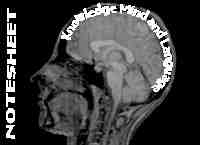

The teleological functionalist approach looks on the brain and nervous system as a machine capable of being analysed functionally. That is to say, we can look at it as made up of a set of subsystems, each of which does a particular job in keeping the system as a whole working.
The same function may be realized in different ways.
It is suggested that we should think of the brain functionally in this sense - as a machine susceptible to functional analysis.
Machine functionalism says the three levels of description are:
Teleological functionalism says the three levels of description are:
Would any system performing the calculations performed by the brain be capable of consciousness? Machine functionalism implies Yes. Some see this as a decisive objection.
Teleological functionalism evades this problem. For it, phenomenal experience is identified with the biological function being performed at the relevant subroutine of the program, so that unless the alternative to my brain was a structure that was organized very similarly to mine, there would be no grounds for thinking it would feel as I do.
In The Matrix a person's brain is connected up to a computer which inputs data with the object of giving the owner of the brain the belief that they are going about a world like ours in an everyday way. The brain and its software now have few if any biological functions. But for the teleological functionalist, consciousness is tied to biological function. This casts doubt then on the idea that a matrified person might have mental states.
Intentionality & qualia